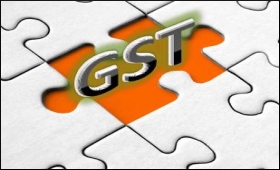|

|
Govt in final stages of talks with states on GST: FM
|
|

|
|
| Top Stories |
 |
|
|
|
SME Times News Bureau | 10 Nov, 2014
The central government is in the final stages of talks with the states on the pan-India Goods and Services Tax (GST) before the relevant bill for implementation is introduced in the upcoming session of parliament, Finance Minister Arun Jaitley said Sunday.
"I'm in the last stages of my discussion with the states on the eve of parliament session, before introducing the amendments to the GST law in parliament," Jaitley said at the India Global Forum meet, hosted here by the International Institute for Strategic Studies.
Seeking support from the opposition parties in passing the key legislation, Jaitley said they should realise that the "merits of some of these actions have positive attitude towards them".
"I do hope that my friends in the opposition parties, particularly the principal opposition, after a wasted opportunity when they were in government, spend a more fruitful tenure when they are in opposition," he added.
The finance minister said the first tranche of compensation to states to make up for their revenue loss from the phasing out of Central Sales Tax (CST) may also be taken up in the upcoming session of parliament.
The previous United Progressive Alliance (UPA) government had in 2011 introduced a Constitution Amendment Bill in the Lok Sabha towards the introduction of the GST. States sought a five-year compensation package and asked for its inclusion in the bill.
States like Gujarat, Madhya Pradesh and Uttar Pradesh, which were earlier standing in the way of GST, have now said they are not opposed to it as long as their concerns are addressed.
Jaitley has assured parliament that the government will seek to move the amendments this year itself, besides already assuring states that he would clear their compensation dues of about Rs.34,000 crore ($5.5 billion) over a three-year period.
The Empowered Committee of State Finance Ministers resolved in August to lower the threshold limit for imposing GST on companies from a turnover of Rs.25 lakh (Rs.2.5 million) to Rs.10 lakh (Rs.one million).
The empowered group also asked that states be given the legal powers to collect tax from businesses with annual turnover of up to Rs.1.5 crore (Rs.15 million).
As per their recommendation, GST would not be imposed on businesses with an annual turnover of less than Rs.10 lakh. Currently, the threshold for Value Added Tax (VAT) is Rs.10 lakh in most states.
On the vexed issue of dual control of traders by both the central and state governments, the demand was for legal powers to collect tax from businesses with an annual turnover of up to Rs.1.5 crore.
Those below the turnover threshold of Rs.1.5 crore would pay their taxes to states, which would subsequently pass on to the central exchequer.
On the items exempted from the purview of GST, the empowered group suggested that these be mentioned in the constitutional amendment bill.
Seen as a key to facilitating industrial growth and improving the business climate in the country, the GST bill needs to be passed by a two-thirds majority in both houses of parliament and by the legislatures of half of the 29 states to become law.
CST was one of the major roadblocks for a GST, which was originally scheduled to come into effect from April 1, 2010.
While CST is levied by the Centre on inter-state movement of goods and collected by states, the issue of compensation arose because the central government cut the CST from 4 percent to 2 percent in phases, after state-level VAT was introduced from April 1, 2005.
By subsuming most indirect taxes levied by the central and state governments such as excise duty, service tax, VAT and sales tax, GST proposes to facilitate a common market across the country, leading to economies of scale and reducing inflation through an efficient supply chain.
Full implementation of GST could lift India's gross domestic product (GDP) growth by 0.9-1.7 percentage points, according to a study by the National Council of Applied Economic Research (NCAER).
The government proposes to implement GST from April 1, 2016.
|
|
|
| |
|
|
|
|
|
|
|
There are other issue
Y.P Sharma | Thu Nov 13 08:03:41 2014
IT IS VERY GOOD TO IMPLEMENT GST BUT I WOULD LIKE TO DRAW THE ATTENSION OF THE GOVT, TO TAKE UP OTHER ISSUES SERIOUSLY SUCH AS DRUGS. I DON'T KNOW WHY THE GOVT IS NOT SERIOUS ABOUT THE ISSUE.

|
|
|
|
|
|
|
| |
| Customs Exchange Rates |
| Currency |
Import |
Export |
US Dollar
|
66.20
|
64.50 |
UK Pound
|
87.50
|
84.65 |
Euro
|
78.25
|
75.65 |
| Japanese
Yen |
58.85 |
56.85 |
| As on 13 Aug, 2022 |
|
|
| Daily Poll |
 |
 |
| PM Modi's recent US visit to redefine India-US bilateral relations |
|
|
|
|
|
| Commented Stories |
 |
|
|
|
|
|
| |
|